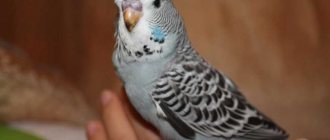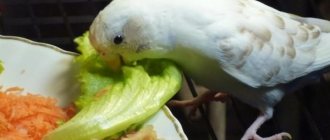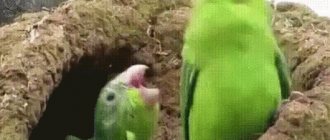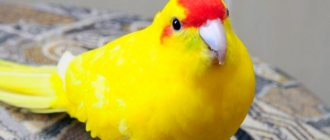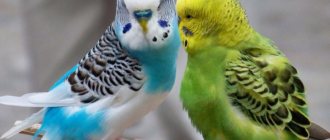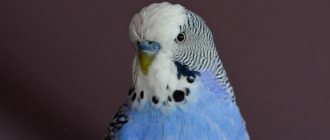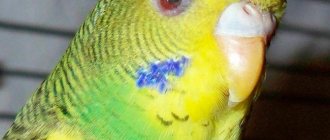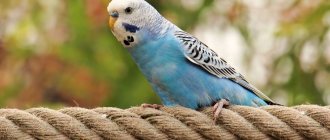- home
- Parrot
- Treatment
02/19/2019 From time to time, after eating, a parrot may regurgitate grain particles. This phenomenon is considered normal, but do not confuse regurgitation with vomiting. Unexpected vomiting in a budgie can be the cause of a very serious and dangerous illness. To identify vomiting in a bird, you need to know the symptoms, and most importantly, what are the reasons for its occurrence.
Behavior when feeling unwell
Vomiting is a symptom of the onset of a certain disease, and not an independent disease. When vomiting, a parrot spits out the contents of its intestines or crop: particles of grains and other food that it could not digest. The owner can understand that something is wrong with his pet by the characteristic twitching and shaking of the head in different directions.
Also, the appearance of the parrot becomes unkempt. His feathers are ruffled, his wings stick out crookedly and fluff is falling out of them. The bird begins to emit an unpleasant odor due to the mucus covering its body. Sometimes he can shrink into a ball and behave completely quietly for a long time. This depends on the fact that it is easier for him to stand on his paws due to the imbalance in the body. To cope with the disease, the bird needs more rest, so it sleeps a lot.
Causes of vomiting
Vomiting in a parrot can be caused by a malfunction of the crop. The crop prepares for the digestion of food. This organ is somewhat similar to a bag. With the help of the crop, the grains become soft, making them easier for the stomach to digest.
When the goiter malfunctions, inflammation of the glands occurs. Because of this, cloudy mucus begins to be released in large quantities. Characteristic features are its viscosity and thickness. The parrot's body reacts extremely negatively to the mucus produced. As a result of attempts to get rid of it, the bird begins to vomit.
Another equally serious cause of vomiting can be gastritis. This disease can manifest itself in two forms: acute and chronic. In the case of gastritis, the stomach becomes inflamed. However, vomiting is not the most dangerous symptom of this disease. Unfortunately, if treatment is not started in time, there can be serious consequences.
Vomiting can also occur if the bird is poisoned. To determine the cause of poisoning, you need to be attentive to drawing up the parrot's menu. Don't think that products that are safe for humans are also safe for your pet. The main causes of poisoning include harmful substances contained in floor cleaning products, as well as other items forgotten near the parrot.
A parrot can also vomit due to improperly selected food. The owner can feed him quite large grains of grain. After which the parrot regurgitates the grains back to get rid of the unpleasant sensation.
Other diseases
Vomiting can occur when affected by bacteria, fungi or viruses with pathogenic properties. Often, the cause of such symptoms is parasites - helminths, ticks, etc.
Many diseases of internal organs, blood poisoning, injuries of various kinds, or stressful situations are likely to cause vomiting and a number of symptoms are much more serious.
Problems with goiter
Goiter inflammation is a rather dangerous disease. At the very beginning it is very difficult to determine. At first, the parrot is no different from a healthy one. However, he is reluctant to eat or refuses food altogether. In mild cases, the patient becomes drowsy. He stops reacting to what is happening around him. Despite this, the pet continues to eat normally. With all this, he cannot swallow food, and the food gets clogged in the crop. There is frequent secretion of copious amounts of saliva.
A budgerigar vomits due to blockage of the crop with foreign objects or large grains. To determine the presence of a blockage, the owner needs to carefully examine his pet from all sides. The goiter becomes large, and when pressed with a finger you can feel it hardening. In case of complications, the bird completely stops eating, because there is a severe inflammatory process in the body. The abdomen begins to sag, the mucous membranes become covered with a blue coating and become cold. The patient develops diarrhea and periodically vomits profusely. Wheezing and severe shortness of breath may also occur. The bird's appearance deteriorates significantly. If nothing is done, strangulation may occur.
Damage to the nervous system can also lead to blockage of the goiter. The parrot begins to eat everything, regardless of whether he is hungry or not. In this case, contacting a specialist is mandatory. Only an ornithologist can establish the correct diagnosis and prescribe the correct treatment.
Treatment
If your parrot is vomiting, you should contact your veterinarian as soon as possible for a diagnosis and treatment. Diseases in birds progress quickly, and incorrect or untimely treatment can lead to the death of the pet.
If vomiting occurs, the usual food is removed from the cage and the pet is put on a therapeutic diet. The parrot is given oats and corn grits; If you have diarrhea, you can make rice porridge. Activated carbon is placed in a separate feeder. There must be clean water in the drinking bowl. It should be remembered that after an attack of vomiting, the bird is not fed for 2-3 hours.
Stomach problems
Pathological expansion of the stomach
This disease occurs due to infection of the stomach by a virus. With each stage, the organ expands more and more, which leads to discomfort. The stomach has difficulty digesting food ingested. The main symptoms include a sharp weight loss in the bird without loss of appetite and a change in its appearance. The parrot leads an inactive life, most often sleeping. The excrement contains pieces of food and whole grains of grain. In more complex cases, damage to the brain and spinal cord may occur. Birds often make circular movements. The possibility of paralysis of the legs and epileptic seizures cannot be ruled out. Without proper treatment, the parrot may die.
Gastritis
As a result of inflammation of the stomach, gastritis may occur. Most often, the disease is noticed only after it has become chronic. It is at this stage that vomiting appears. Due to the stagnation of excess food in the intestines, a complication of the disease occurs. In addition to vomiting, this disease can cause damage to the central nervous system, which can lead to seizures. Therefore, you should not self-treat your pet. A veterinarian is best suited to handle the task.
Gastrointestinal diseases
With diseases of the digestive system, the general condition of the parrot’s body worsens. This is often accompanied by vomiting and diarrhea. This happens due to the accumulation of fluid in the abdominal area or swallowing a large volume of air when eating. This is caused by intestinal obstruction or volvulus. This condition is possible due to narrowing of the blood vessels of the gastrointestinal tract, as well as their inflammation. An ulcer or tumor can also cause occasional vomiting.
How can you tell if your parrot is sick? Symptoms.
The main signs of illness in a parrot
Early signs of parrot disease are often missed by the average owner.
In the wild, a sick bird will try to maintain a normal appearance and hide the disease for as long as possible, otherwise it will very quickly become the prey of a predator. One of the results of this behavior is that by the time the signs of the disease become obvious to humans, the bird’s body is so exhausted by a long illness that there is no longer any strength to hide the malaise, and usually these are the last days or even hours of the pet’s life.
The reason a parrot dies "suddenly" may be the owner's inability to detect small changes in the bird's appearance or behavior.
For this reason, owners should know the early signs of illness in parrots in order to contact an ornithologist veterinarian in time, which will increase the chances of recovery and reduce treatment costs.
Parrot droppings assessment
Droppings can be an indicator of your bird's health. Using paper towels, newspaper, or sheets of paper to line the bottom of the cage, you can assess the amount, volume, color, and consistency of the droppings. A healthy bird's droppings will vary in appearance depending on the diet and type of bird.
Normal litter for a parrot
Parrot droppings may vary slightly in color and consistency. Diets high in seeds typically produce uniform, dark green feces.
Soft, brownish feces are commonly found in birds fed commercial feed. Colored granules may cause stool to change color. Urine is usually a clear liquid. A diet high in plant and fruit substances can increase the content of the urinary component, that is, a fairly significant amount of the liquid part of urine appears.
Owners often confuse increased urine and diarrhea (diarrhea). This in turn leads to the incorrect position “do not give fruits and vegetables!” You shouldn't do this.
For all types of parrots, fruits, vegetables, and all succulent plant foods are the basis of their diets.
Bird urine consists of two parts:
- Liquid and transparent, often viscous - true urine;
- Urates are a white, thick, creamy part, which in turn can take on the color of eaten fruits, vegetables, and colored food ingredients. These are uric acid salts, which are normally always present in birds, envelop the fecal part of the droppings, or lie in the form of a large drop in the droppings, drying out like chalk.
Abnormal droppings from a parrot
- Reducing the total number or volume of litter
- Change in urate/urine color to green or yellow
- Unformed fecal part of the litter
- Increased urine output (polyuria)
- Decrease in stool volume with increasing amount of urates (polyurates)
- Presence of blood
- Black or very dark green color of droppings, in the absence of ingredients in the food that can give this color (charcoal, blueberries, black grapes, etc.)
- Any strong odor in the litter
A slight specific odor may be normal:
- In females that lay eggs
- In hand-fed chicks
- In the first half of the day
- As a result of nervousness and stress
Under normal circumstances, an owner should evaluate several litters before becoming concerned.
Other early signs of illness in a parrot
The following symptoms may not require emergency treatment. However, they are a deviation from the norm and if they appear, it is recommended to contact a veterinarian ornithologist.
- Prolonged molting or constant detection of lost feathers
- Broken, bent, torn, or chewed feathers
- Unusual or dull feather color
- Soiled feathers above the nostrils, eyes, ears, beak and cloaca
- Crusts in or around the nostrils
- Redness, swelling, or loss of feathers around the eyes
- Ulcers on the soles of the paws, damage to the skin of the paws
- Lameness or shift of body weight on one of the legs when not at rest (tucks in the paw, stands on one paw)
- Excessive beak or claw growth
- Minor changes in Twitter, conversation
- Change in appetite
Signs of a serious illness
The following signs may indicate serious health problems and you should seek immediate veterinary help (in parentheses are complaints about the condition of parrots that we often hear from bird owners)
- Significant changes in the amount and appearance of droppings ("a lot/little, black/white/green/thin/yellow/with water")
- Reduced or excessive food or water intake
- Changes in posture, character traits, behavior (“doesn’t play”, “sad”, “started to sit at the bottom of the cage”...)
- Fluffy pose (“the parrot will fluff up”...)
- Decreased vocalization (“the parrot stopped talking / whistling / singing”...)
- Changes in breathing or abnormal breathing sounds at rest or during flight (“heavy/fast/strong breathing/breathing with a whistling or sound)
- Changes in weight and general condition of the body
- Seals, swellings on the body (“a lump has grown”)
- Any bleeding or injury
- Vomiting or nausea
- Discharge from the nostrils, eyes, or mouth
Emergency first aid
Warmth and food are the two most important factors in temporarily caring for a sick bird until it can be seen by an ornithologist. The bird should be kept in a quiet place, separate from its relatives, minimizing irritating factors (light, contact, noise).
Warm
The ideal ambient temperature for sick birds is 26.5-29.5 degrees. We usually recommend using directed heat - this is a 40W incandescent lamp directed obliquely towards the cage where the parrot sits. To understand the temperature that the parrot feels, place your hand between the lamp and the bird, and if it is hot, move the lamp further away. The lamp should shine so that the second part of the cage is in the shadow, and if desired, the bird can always hide there from the heat source. If the bird begins to breathe rapidly or holds its wings open, the temperature is too high.
Food
Every effort must be made to get the bird to eat. Place the feeder in close proximity to the bird. Try hand-feeding the bird. Water can be offered to the bird drop by drop using a syringe or pipette.
- Do not force feed or water a bird that is too weak to swallow.
- Do not give any medications or treatments that have not been specifically prescribed for the bird.
- Don't wait for the bird's condition to worsen!
- Call the veterinary clinic!
The leading direction of the Constellation Veterinary Center is the treatment of birds. Qualified specialists - leading ornithologist doctors in Russia, digital x-ray, own laboratory, where they know how to carry out laboratory diagnostics of birds. Everything is aimed at providing qualified assistance to birds in any condition.
Poisoning
Often, due to their excessive curiosity, parrots eat various small objects that are not intended for food. The consequence of this can be food poisoning, which leads to painful sensations in the stomach. Often, a bird can be poisoned by medicine forgotten near it. During poisoning, the parrot constantly vomits and swears. It is very important to immediately seek help from a doctor to avoid the death of your pet.
Poor care
One of the simple causes of vomiting can be non-compliance with poultry management standards. Not only the health of the bird, but also its future life depends on proper care. In the room with the parrot, a comfortable temperature of 20–25 degrees must be maintained. Under no circumstances should drafts be allowed. Temperature changes negatively affect your pet's immunity.
Sometimes improper feeding can lead to vomiting. You can’t suddenly change the type of food you eat, because the bird’s body takes a very long time to adapt. It is necessary to comply with the norm of protein, vitamins and minerals to avoid allergies and subsequent vomiting. The owner must monitor the amount of food the parrot eats to avoid overfeeding.
Houseplants and wild plants that are poisonous to parrots
When purchasing a feathered friend, you want to not just put a cage on the bedside table in the room, but to organize a small green corner that would harmoniously fit into the interior and at the same time create the illusion of life in nature for your pet. For this purpose, owners purchase beautiful indoor plants. However, not all plants are “friendly” for birds, and some are even deadly. By reaching out to such a plant from a cage or simply walking along the windowsill and pinching the leaves of a poisonous plant, a parrot can become poisoned.
Houseplants and bouquets that are poisonous to parrots
| Partially toxic plants | Plants that cause allergic reactions and digestive disorders | Deadly plants |
| Gladiolus | Primrose | Ivy |
| Tulip | Ferns | Oleander |
| Heather | Honeysuckle | Spurge |
| Hyacinth | Alocasia | Lily of the valley |
| Hemanthus | Azalea | Dieffenbachia |
| Snowdrop | Aglaonema | Christmas star |
| Iris | Hippeastrum | Asparagus |
| Laurel | Clivia | |
| Crocus | Nightshade | |
| Paprika | ||
| Croton | ||
| Adenium | ||
| Alamanda | ||
| Catharanthus |
Wild plants that are poisonous to parrots
| Dangerous plants | Deadly plants |
| horse chestnut | Black henbane |
| Cheremsha | Ledum |
| Buttercup | Common Datura |
| Birch mushroom | Spring Adonis |
| Medicinal clover | Belladonna |
| Yarrow | Veh (hemlock) |
| Wormwood | Cheremsha |
| Aralia | Fragrant rue |
| Jaundice | Celandine |
| Flat-leaved ragwort | Tansy |
| St. John's wort | Fern (shield fern) |
| Chinese lemongrass | Garmala (burial ground) |
| Caucasian lemongrass | Medicinal black root |
| Rhodiola rosea | |
| Hop | |
| Spiny tartar | |
| Eleutherococcus |
Share with your friends:

